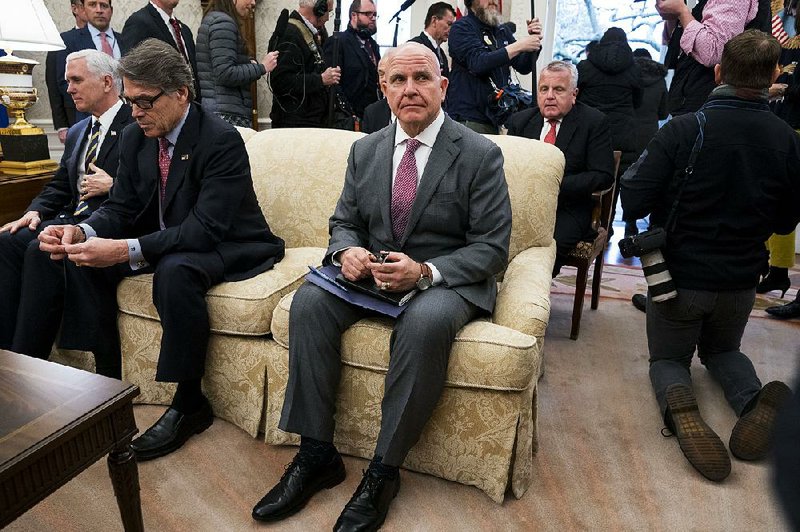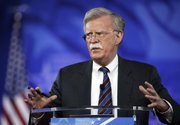WASHINGTON -- President Donald Trump said Thursday that he was naming former U.N. Ambassador John Bolton, now a conservative Fox News commentator, as his new national security adviser, replacing Lt. Gen. H.R. McMaster.
The president announced the news in a tweet: "I am pleased to announce that, effective 4/9/18, AmbJohnBolton will be my new National Security Advisor. I am very thankful for the service of General H.R. McMaster who has done an outstanding job & will always remain my friend. There will be an official contact handover on 4/9."
Bolton called the appointment "an honor" in a late Thursday statement, saying he looks "forward to working with President Trump and his leadership team" to "make our country safer at home and stronger abroad."
The role of national security adviser does not require Senate confirmation.
In a statement released by the White House, McMaster said he would be requesting retirement from the U.S. Army effective this summer, adding that afterward he "will leave public service."
The White House said McMaster's exit had been under discussion for some time and stressed it was not due to any one incident, such as this week's leak about Trump's recent phone call with Russian President Vladimir Putin.
McMaster had briefed Trump before the Putin call -- and his team drafted all-caps instructions telling Trump not to congratulate the Russian leader on his re-election victory. Trump did it anyway.
An internal investigation into the leak is underway, said a White House official who -- like others interviewed about the announcement and the White House shake-up -- demanded anonymity to discuss internal matters.
McMaster, a three-star general, came to the Trump administration with an accomplished combat record in Iraq and a reputation as one of the Army's best thinkers on the subject of battling insurgents and the future of war. His 1997 book, Dereliction of Duty, was critical of the military's top brass for passively backing a strategy in Vietnam, advanced by the White House, that they knew would not lead to victory.
Yet as national security adviser, McMaster never forged the kind of bond that would allow him to speak honestly to the president. At times, Trump, who complained that McMaster was stubborn, didactic and long-winded, seemed to tune out the active duty general.
Tension between Trump and McMaster had grown increasingly public. Last month, Trump took issue with McMaster's characterization of Russian meddling in the 2016 election after the national security adviser told the Munich Security Summit that interference was beyond dispute.
"General McMaster forgot to say that the results of the 2016 election were not impacted or changed by the Russians and that the only Collusion was between Russia and Crooked H, the DNC and the Dems," Trump tweeted Feb. 17, alluding to frequent GOP allegations of impropriety by Democrats and Hillary Clinton.
It had appeared McMaster's departure was imminent last week -- but White House officials insisted the speculation was false.
"Just spoke to POTUS and Gen. H.R. McMaster -- contrary to reports they have a good working relationship and there are no changes at the NSC," White House press secretary Sarah Huckabee Sanders tweeted late March 15.
Trump is reshaping much of his national security team ahead of planned talks with North Korean leader Kim Jong Un in the coming weeks and as he faces a key decision in May on whether to maintain the Iran nuclear deal. Trump fired Secretary of State Rex Tillerson on March 13, saying the two had disagreed over Iran and other matters of foreign policy.
Tillerson's exit forecast trouble for McMaster, who had aligned himself with the embattled secretary of state in seeking to soften some of Trump's more contentious foreign policy desires.
In Bolton, Trump has chosen a frequently combative personality who fits more with his style, but it wasn't clear how White House staff members will react to their new boss.
McMaster is credited with improving morale and bringing order to the National Security Council after the forced departure early last year of his predecessor, Michael Flynn, for not being forthright about a conversation with Russia's ambassador at the time.
Flynn has since pleaded guilty to making a false statement to the FBI and is cooperating with Robert Mueller, the special counsel investigating Russia's interference in the 2016 election.
McMaster's biggest win -- and area of greatest influence -- was the war in Afghanistan, where he convinced the president to nearly double the size of the force to 15,000 troops. But Trump, who said he went against his own instincts when he approved the surge, never seemed to buy into the new strategy and resented McMaster for pushing it on him, U.S. officials said.
Still, Trump said in a statement that "H.R. McMaster has served his country with distinction for more than 30 years" and that his "leadership of the National Security Council staff has helped my administration accomplish great things."
[PRESIDENT TRUMP: Timeline, appointments, executive orders + guide to actions in first year]
CONTENTIOUS BOLTON
Bolton, a contentious foreign policy expert who briefly served as U.N. ambassador, has been a force in Republican foreign policy circles for decades.
He has served in the Republican administrations of Ronald Reagan, George H.W. Bush and George W. Bush, and served as a Bush lawyer during the 2000 Florida recount.
Bolton, 69, brings a far more interventionist view into Trump's inner circle.
A strong supporter of the Iraq war and an advocate for aggressive use of American power in foreign policy, he was unable to win Senate confirmation after his 2005 nomination to the United Nations post alienated many Democrats and even some Republicans.
Bolton resigned after serving 17 months as a "recess appointment," which allowed him to hold the job on a temporary basis without Senate confirmation.
At the time, Bolton was often at odds with then-Secretary of State Condoleezza Rice. She told colleagues that Bolton undermined her and went behind her back to then-Vice President Dick Cheney, his old friend and patron.
Those old grievances resurfaced before Trump took office, when as president-elect he considered selecting Bolton as deputy secretary of state. That job would have been subject to Senate confirmation, and opposition was swift and bipartisan. Sen. Rand Paul, R-Ky., vowed to block it, and the nomination never materialized.
Trump's selection of Bolton as his national security adviser drew raves from more hawkish members of Congress.
"Selecting John Bolton as national security adviser is good news for America's allies and bad news for America's enemies," said Sen. Lindsey Graham, R-S.C.
Democrats and some Republicans reacted with concern that Bolton's hawkish positions could lead to more conflict.
Bolton's positions on Iran and North Korea "are overly aggressive at best and downright dangerous at worst," said Sen. Christopher Coons, D-Del.
In recent years Bolton has served as a Fox News contributor and senior fellow at the conservative-leaning American Enterprise Institute. He has also been a frequent behind-the-scenes visitor to Trump in the Oval Office and had campaigned openly to replace McMaster in recent weeks.
In early March, Bolton met with Trump and Chief of Staff John Kelly to discuss North Korea and Iran. He was spotted entering the West Wing earlier Thursday, and hours later, Bolton confessed surprise at how quickly Trump announced the appointment.
"This hasn't sunk in," he said on Fox News, where he was pre-scheduled for an interview.
Bolton is a fierce North Korea hawk who, in his prolific writings and television commentary, has said that pre-emptive war would likely be the only way to stop North Korea from obtaining the capability to attack the United States with a nuclear missile.
Bolton, who had dismissed negotiations with North Korea as a waste of time, moderated his views slightly after Trump announced he would sit down with Kim. He described Trump's decision as "diplomatic shock and awe" and suggested that the encounter between the two leaders would be short and largely devoid of traditional diplomacy.
"Tell me you have begun total denuclearization, because we're not going to have protracted negotiations," he imagined Trump telling the North Korean. "You can tell me right now or we'll start thinking of something else."
On Iran, Bolton has been even more hawkish than Trump, pushing for the president to withdraw from the nuclear agreement that the United States and five other world powers reached with Tehran during President Barack Obama's administration.
In January, Bolton told Fox News that Trump should dump the nuclear deal, reimpose economic sanctions on Tehran, and work toward an overthrow of the government there.
"There's a lot we can do, and we should do it," Bolton said. "Our goal should be regime change in Iran." He similarly called for bombing Iran in a New York Times editorial in 2015.
Bolton, in the Thursday night Fox News interview, downplayed the significance of his past public statements, saying he would defer to the president's judgment.
"I've never been shy about what my views are," Bolton said. But, he added, that "now is behind me, at least effective April 9, and the important thing is what the president says and what advice I give him."
Information for this article was contributed by Greg Jaffe, Josh Dawsey, Anne Gearan, John Hudson, Karen DeYoung and Robert Costa of The Washington Post; by Jill Colvin, Catherine Lucey, Ken Thomas and Zeke Miller of The Associated Press; and by Nick Wadhams, Toluse Olorunnipa, Jennifer Jacobs, Margaret Talev and Jennifer Epstein of Bloomberg News.
A Section on 03/23/2018

